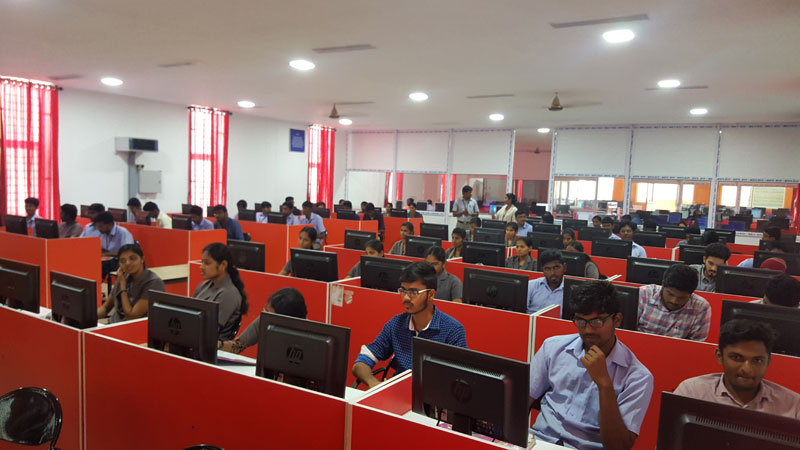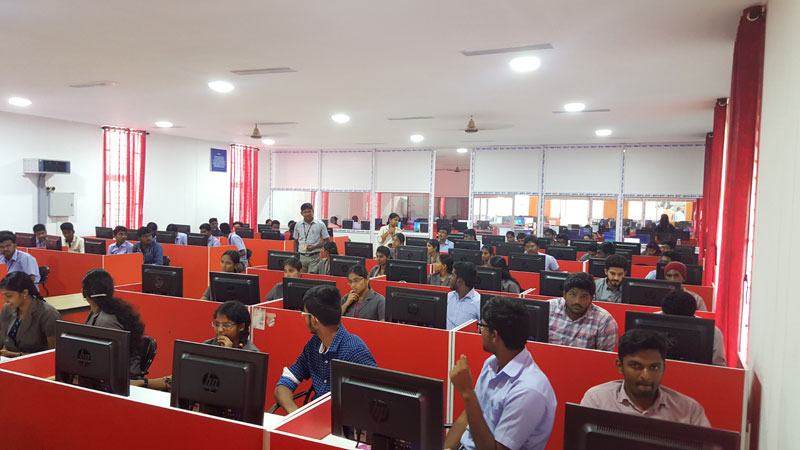The Department of Artificial Intelligence and Machine Learning was established in the year 2020 with a mission of producing students with a sound understanding of the fundamentals of both theory and practice of Artificial Intelligence and Machine Learning. The mission is also to mould them to attain excellent leadership qualities thereby making them competent in the software, hardware and research arena. Finally, the mission is to meet the pressing demands of the nation in the areas of Artificial Intelligence and to help lead the development of the discipline of Machine Learning, by performing leading research in this field, by developing and propagating a model academic curriculum for the field, and by helping society to benefit from the knowledge gained by the field.
The department has highly qualified, committed and research-oriented faculty members. Faculty members of the department are very enthusiastic about research activities and very keen on publishing papers in International/National journals.Artificial intelligence (AI) is wide-ranging branch of computer science concerned with building smart machines capable of performing tasks that typically require human intelligence. The field of artificial intelligence has been an interdisciplinary endeavor, requiring deep knowledge of both computational and human sciences. Machine learning is an application of artificial intelligence (AI) that provides systems the ability to automatically learn and improve from experience without being explicitly programmed. Machine learning focuses on the development of computer programs that can access data and use it learn for themselves.
To impart quality education for students in the field of Artificial Intelligence and human-machine partnership in the technological-embedded world and create competent professionals who serve the greater cause of society.
M1: To provide a student-centric learning environment to create competent professionals with knowledge in artificial intelligence, machine learning techniques, natural language processing, deep-learning and computer vision.
M2: To facilitate the students to develop the necessary skills to sustain in today’s globalised technological society, in pursuit of excellence by keeping high personal and professional values and ethics.
M3: To nurture their skills in research and innovation that contributes to the development of society.
Engineering Graduates will be able to:
1. Engineering knowledge: Apply the knowledge of mathematics, science, engineering fundamentals, and an engineering specialization to the solution of complex engineering problems
2. Problem analysis: Identify, formulate, review research literature, and analyze complex engineering problems reaching substantiated conclusions using first principles of mathematics, natural sciences, and engineering sciences
3. Design / development of solutions: Design solutions for complex engineering problems and design system components or processes that meet the specified needs with appropriate consideration for the public health and safety, and the cultural, societal, and environmental considerations
4. Conduct investigations of complex problems: Use research-based knowledge and research methods including design of experiments, analysis and interpretation of data, and synthesis of the information to provide valid conclusions
5. Modern tool usage: Create, select, and apply appropriate techniques, resources, and modern engineering and IT tools including prediction and modeling to complex engineering activities with an understanding of the limitations
6. The engineer and society: Apply reasoning informed by the contextual knowledge to assess societal, health, safety, legal and cultural issues and the consequent responsibilities relevant to the professional engineering practice
7. Environment and sustainability: Understand the impact of the professional engineering solutions in societal and environmental contexts, and demonstrate the knowledge of, and need for sustainable development
8. Ethics: Apply ethical principles and commit to professional ethics and responsibilities and norms of the engineering practice
9. Individual and team work: Function effectively as an individual, and as a member or leader in diverse teams, and in multidisciplinary settings
10. Communication: Communicate effectively on complex engineering activities with the engineering community and with society at large, such as, being able to comprehend and write effective reports and design documentation, make effective presentations, and give and receive clear instructions
11. Project management and finance: Demonstrate knowledge and understanding of the engineering and management principles and apply these to one’s own work, as a member and leader in a team, to manage projects and in multidisciplinary environments
12. Life-long learning: Recognize the need for, and have the preparation and ability to engage in independent and life-long learning in the broadest context of technological change
PEO1: To acquire strong knowledge in the domain of artificial intelligence and machine learning theory and principles for identifying, analyzing and solving problems.
PEO2: To enable students to build intelligent machines, software, or applications with a cutting-edge combination of machine learning, analytics, and visualization technologies.
PEO 3: To improve students' ability to work effectively within a team and apply appropriate practices within a professional, legal and ethical framework for societal needs, and accomplish sustainable progress through lifelong learning and research.
PSO 1: An ability to apply advanced core AI technologies, to extract information and provide knowledge to intelligent decision-making systems and human-AI collaboration
PSO 2: An ability to develop a principled and thoughtful approach to the machine learning tools that can address complex cognitive tasks for the betterment of society.
“Make the most of yourself. For that is all there is of you”
I believe that Artificial Intelligence and Machine Learning discipline has been widely recognized as an essential source and technique for the advancements in all spheres of human Endeavour now and in future. Learning is a continuous process and does not end with the acquisition of a degree. The steady and rapid advances in computing technologies shorten the life of tools and techniques prevalent today. Therefore, we don’t aim to make our students walking manuals of any language or package. Instead, they are given a strong foundation in computer science and problem-solving techniques and are made adaptable to changes. We are a small family today and growing at a rapid pace. We have a variety of students and young talents coming from all around India with a good mix of faculties from various fields of expertise making the department a place for quality research and teaching. We currently focus on areas that relates to Computer Security and Artificial Intelligence, Computer Vision and Machine Learning aspects of Computing. We also encourage research in mathematical and algorithmic aspects of computing and have students and faculties working on parallel and distributed computing, optimization, compilers etc. I invite interested and motivated students and faculties to look forward to Hindusthan College of Engineering Technology as a destination for high end research and teaching in India.
Laboratory contains the latest Core 2 Duo Systems supporting laboratory work. The laboratories are well equipped with a large collection of software like Rational Rose, Visual Studio .NET, Oracle, MySQL, OPNET, NS2, CISCO PACKET TRACER etc. Each lab is provided with projectors to enable the students to visually experience the practical classes. The department has established an intranet named NETROVER on which the faculty hosts tutorials, assignments, class tests, additional learning materials, e-books and online aptitude tests for training the students for better placement opportunities.

